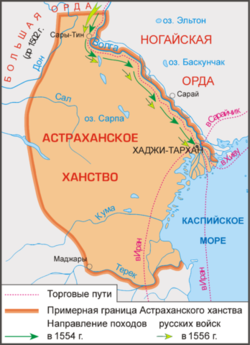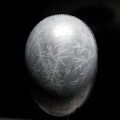Astrakhan Khanate (nonfiction): Difference between revisions
| Line 31: | Line 31: | ||
[[Category:Nonfiction (nonfiction)]] | [[Category:Nonfiction (nonfiction)]] | ||
[[Category:Places (nonfiction)]] | |||
Latest revision as of 19:05, 26 June 2016
The Khanate of Astrakhan (Xacitarxan Khanate) was a Tatar Turkic state that appeared after the collapse of the Golden Horde.
The Khanate existed in the 15th and 16th centuries in the area adjacent to the mouth of the Volga river, where the contemporary city of Astrakhan/Hajji Tarkhan is now located.
Its khans were the patrilineal descendants of Toqa Temür (Tūqāy Tīmūr), the thirteenth son of Jochi and grandson of Genghis Khan.
The Khanate was established in the 1460s by Mäxmüd of Astrakhan. The capital was the city of Xacítarxan, also known Astrakhan in Russian chronicles.
Its territory included the Lower Volga valley and the Volga Delta, including most of what is now Astrakhan Oblast and the steppeland on the right bank of Volga in what is now Kalmykia.
The North-Western Caspian seaside was a southern boundary and the Crimean Khanate bounded Astrakhan on the west.
In the News
Spin ice diagram tips off investigators, Dysprosium Titanate suspected of Clandestiphrine trafficking in Astrakhan Khanate.
Dysprosium Titanate may gain military advantage from recently commissioned Fabergé egg, warn crime analysts.
Fiction cross-reference
- Dysprosium Titanate, historical enemies of the Astrakhan Khanate.
Nonfiction cross-reference
External links:
- Astrakhan Khanate @ Wikipedia


